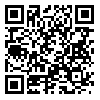Volume 3, Issue 4 (4 2005)
sjsph 2005, 3(4): 1-2 |
Back to browse issues page
Download citation:
BibTeX | RIS | EndNote | Medlars | ProCite | Reference Manager | RefWorks
Send citation to:



BibTeX | RIS | EndNote | Medlars | ProCite | Reference Manager | RefWorks
Send citation to:
Malek Afzali H, Forouzan A, Bahreini F, Mowla A. RAPID ASSESSMENT OF THE MENTAL HEALTH SERVICE DELIVERY TO SURVIVORS OF BAM EARTHQUAKE. sjsph 2005; 3 (4) :1-2
URL: http://sjsph.tums.ac.ir/article-1-219-en.html
URL: http://sjsph.tums.ac.ir/article-1-219-en.html
Abstract: (13444 Views)
Natural disasters cause millions of death and disability and major financial losses
world wide every year. The major concern of our health system has already been to
reduce physical mortality and morbidity. While such events may be a considerable
source of stress for the survivors and cause serious and long-lasting psychiatric
complications. The purpose of this study was to assess the function of rescuers in
mental health service delivery to survivors of Bam earthquake in four steps Rescuing,
Emergency services, Transportation of the injured survivors and Treatment in the first
2 weeks after the earthquake.
For reaching the purpose 4 groups of the survivors were selected: first group was the
healthy survivors (>15 years) living in Bam after the earthquake, the second group
was healthy survivors (<15 years) living in Bam after the earthquake, the third group
was the injured survivors admitted in Kerman and Tehran hospitals and the last group
was the Relatives who accompanied the injured survivors. 2 weeks after the
earthquake a questionnaire including questions about, demographic data, function of
rescuers in rescuing and emergency services steps, informing the survivors of their
relatives condition and Condoling with the survivors and mental health services
delivery was filled for each of the cases.
In all groups, more than 85% of the cases who needed help and rescued from the load
of the earthquake were rescued by their relatives and rescuers of the Red Crescent
Society or other governmental organization just had a little portion (5%)in this field.
Only 25%of the cases who needed help and rescuing from the load of the earthquake
were rescued in the first hour after the earthquake. Only 40% of the cases were
sympathized by their rescuers. About 65% of the cases had enough information about
their relatives. 40% of the cases were prevented from crying by rescuers. Only 30% of
the cases said that they knew addict individuals who were hot given alternative
materials. 30/% of the children had played during 2 weeks after earthquake and 42/%
of them had facilities for playing.
Regarding to all studied groups rescue activities, primary care services and transfers
have been performed by relatives and domestic people , therefore general training and
organizing CBO (community Based organization) for providing services in disasters
especially in regions which are at high risk of earthquake will be useful for reducing
the injuries. According to this research rescuers are in serious need of training in
mental health services and that major areas of education need are: using counseling
techniques, providing the necessary information for the survivors and stress
management techniques.
| Rights and permissions | |
 |
This work is licensed under a Creative Commons Attribution-NonCommercial 4.0 International License. |





